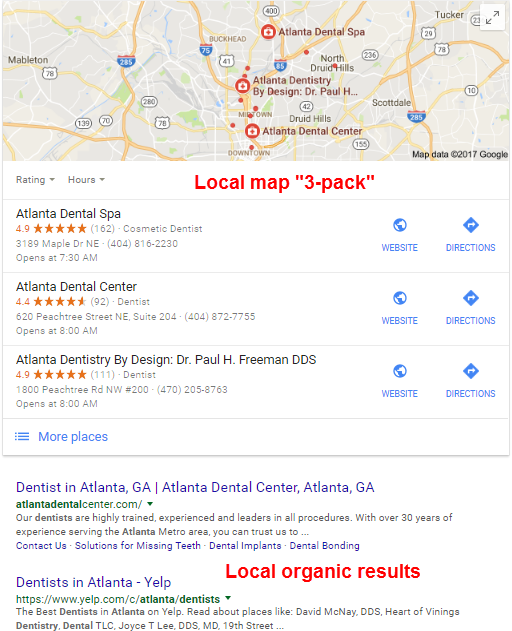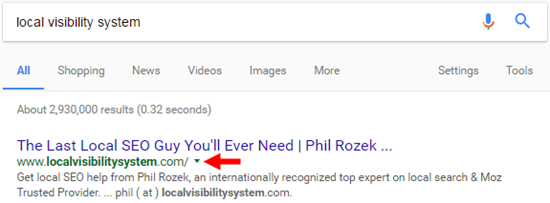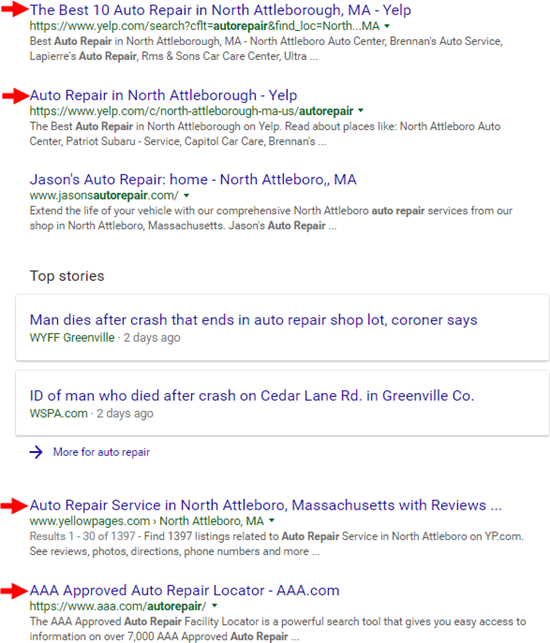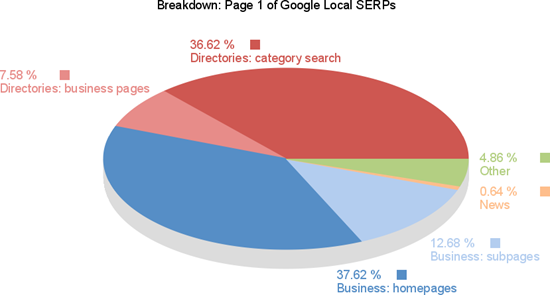Though the first page of Google’s local results usually consists of 3 “local map” results plus 10 organic results, that doesn’t mean your business has 13 chances to rank somewhere on page one. Nor do all pages on your site have an equal chance at ranking. Nor does having the most-dominant site necessarily mean you’ll get the most or best visibility in the local results.
How well your business ranks in the local “3-pack” depends on many factors, including where your business is, where the searcher is, who clicks on you and other behavior, the name of your business, and – above all – on how well you rank in the local organic results (the “10 blue links,” usually right below the local map).

Your organic rankings, in turn, depend mainly on how relevant your site is to what the customer searched for and (even more so) on how good your links are.
So what are your chances of getting your business’s site to rank somewhere on page 1 of the local organic results?
One way to answer that is to know how Google usually fills up the first page of local organic results – Google’s tendencies and quotas, you might say.
Google has a very specific way of carving up the local search results. It’s not all local businesses, nor is it a grab-bag of “something for everyone” search results.
I’ve just done a study of 500 local markets – 500 first-pages of local search results – and have some numbers on which sites and pages typically rank on page one.
Here’s the pie-chart, which sums up my findings and the dozens of hours of research that went into it.
(click to enlarge)
You may not need to know any more. Or you may want more detail on the pie, on my methodology, and on what it all means for your local SEO strategy. In the latter case, just read on.
What does each slice of the pie represent, exactly?
“Business: homepages”
I’m referring to the homepage of a site that belongs to a specific business.

Homepages are the biggest slice of the pie, averaging 37.62% of Google’s local organic search results. On average, 3-4 out of 10 of the organic results consist of one homepage or another. The homepage typically has the most link-juice (which is one reason I usually suggest using it as your Google My Business landing page). It’s no surprise to me so much of page one goes to various homepages.
“Business: subpages:
If homepages constitute more than 3 out of 10 spots on a typical first page of results, that must mean other pages usually grab the other 7 spots – right?
Wrong. Subpages (like yourbusiness.com/city) and subdomains (like city.yourbusiness.com) only account for 12.68% of the 5000 individual search results I studied. In a typical first page of results, only 1-2 results are for pages on a business’s website other than the homepage.

So 37.62% of the results are for businesses’ homepages, plus 12.68% are for other pages on businesses’ sites. That’s about half of the pie.
Who gets the other half of Google’s local organic search results?
“Directories: category search”
It probably doesn’t surprise you that local-business directories take up a lot of real estate on page one. I’m talking about Yelp, BBB, YellowPages, and so on, and industry-specific sites like Zillow, HealthGrades, TripAdvisor, etc.
Those directories’ internal search results show up more often than do other pages on their sites. “Search results within search results” take up a whopping 36.62% of Google’s local organic results.

“Directories: business pages”
Sometimes a business’s Facebook or Yelp or BBB or YellowPages page will rank on page one for a popular search term.
Known as barnacle local SEO, it’s great if you can get an online property other than your site to rank for a main keyword. But it’s tough to do. Only 7.58% of Google’s search results go to directory results for specific businesses.
“News”
Local-news sites and other sources of news take up a small piece of the search results (not as much as I thought they would). News results made up 0.64% of the results I studied.

Good coverage can drive business. A unfavorable piece can dog you. News stories tend to have many backlinks, usually are on authoritative sites, and tend to get clicked on often. Because of those things, news pieces can stick around for a while. The news isn’t always “new.”
“Other”
Google throws other results onto page one, too. The most-common “other” sites I ran across were Craigslist listings, Indeed.com (for jobs), weird directory results (e.g. Yelp forum threads), and government sites – usually local government.
Methodology & notes
When Sydney Marchuk (of Whitespark) and I did this research, we tried to be as methodical and scientific as possible. As with most studies, there are limitations to this one, and I’m sure there are some holes.
You can look at our raw data here, but here are some lab notes:
- We Googled 500 different search terms – 500 different combinations of cities and keywords
- We searched for explicitly local search terms: “city + keyword.” As opposed to typing in “keyword” and seeing what local search results Google shows you. (Yes, Google is watching you.) In my experience, the results differ a little between when you type in the city and when you don’t. To do a study on that would be more technically complicated and even more of a slog, but I’d love to do one or see one some time.
- As I said at the start, we didn’t include the Google Maps “3-pack” rankings in this analysis. Again, we just looked at the localized organic results – which usually contain all the business that rank in the 3-pack.
- Sydney lives in Canada, but searched at Google.com (not .ca), was signed out of Google, and used an incognito browser tab. The results weren’t biased by search history or anything like that. In any case, I live in Massachusetts, and the searches I did matched up with what Sydney found.
- We did the research in mid-December – about a month ago. Some of the SERPs surely have changed since then, but I doubt they’ve changed significantly. To the extent I’ve had to spot-check some of the results in the past few days, I’ve found that they’ve changed very little.
- Of course, the breakdown will change over time. It’s Google. They like to twist the dials.
Conclusions (very general)
What does the breakdown of a typical page one mean – especially for your business? Some things I’ve gleaned from looking at the data (and from doing local SEO for 8+ years):
- On average, only about 5 of the results are for specific businesses. Your other competitors are directories. Wherever you can’t beat ‘em, join ‘em. You’ll get some visibility either when people click on the directories’ “search results within search results,” or if you get your listing or page itself on the site to rank on page one of Google’s local results. That’s often just a matter of piling on the reviews.
- Homepages dominate, especially in markets where smaller, locally-based businesses duke it out mostly with each other, and not as much with Big Ugly Corporations that happen to have a nearby branch. Again, homepages tend to have most or all of the link juice. Assuming you’ve got at leasta few decent links, if you have some good local content on your homepage it should have a good chance of ranking well.
- Subpages (example.com/city) tend to be more dominant in markets where big businesses tend to congregate (e.g. car rentals). I have my theories as to why that is, but that’s for another day.
- Your crappy keyword-stuffed blog post from 2 years ago probably won’t rank on page one for any semi-competitive term. (Maybe if it attracted some good links.)
- Given how Google splits up the real estate between directories and businesses’ sites, dominance isn’t a matter of just getting your site to rank. As I’ve said, it’s not about site vs. site; it’s reputation vs. reputation.
Here’s the pie, once again:
—
Any questions on my findings?
Any conclusions you’ve drawn (that I didn’t mention)?
Leave a comment!
P.S. If for some crazy reason you want to do an (unrelated) study of your own, consider hiring Sydney to help (schedule permitting). You can email me, or connect with her on LinkedIn.


Excellent study here Phil and Sydney. Also confirms what I have been seeing for some time – homepages rank well, as do directories. Would also be interesting to see what is ranking in the 3 Pack, though I assume most of what is there is a business homepage. I have yet to see directories (categories or business pages) show there.
You mention you performed the study in mid December. Were you tracking these keywords for any amount of time prior to the study or did you simply Google and record the SERPs on that day?
Good write up. Thanks for the link as well 😉
Thanks, Brian.
No, we weren’t tracking the keywords before the study. It took multiple days in December to look at all these markets.
Phil
Thanks! Very interesting.
Do you happen to have the mode & median for this data? Was there a lot of variation in the results or did they cluster around the averages?
You mention Facebook, Yelp, BBB or YellowPages pages as “Directories: business pages” that might rank. Were there any others?
Thanks, Mike.
No, I do not have the mode and median for the data. (That was one of several things I considered doing, but didn’t, because I wanted to keep the scope manageable.)
There was a good deal of variation in the results. As often as not they didn’t adhere to the averages. It varied big-time by industry and by market (big city vs. smaller city).
FB, Yelp, BBB, and YP have long seemed the most common “barnacle” sites, and they’re what I noticed here. I think we saw a smattering of other sites, but not enough for me to remember specifically which.
Great post, thank you!
Phil – this is very interesting. The 500 markets – can you give us any insight as to location, density, etc.?
Locations: all over the place. Density: small cities and large cities. No hamlets. It would be interesting to do the same study with a sample of Mayberrys.
Interesting stuff! Thanks for putting in the work, putting this together, & sharing it with the rest of us. We have also found that ranking subpages in local organic is far more challenging. It’s easier & less time-consuming to create subdomains for the purpose, but there are other drawbacks to that approach. Always so many things to consider!
Yeah, subpages not only have less link juice (typically), but it’s also harder to get good links specifically to those pages. They seem to work best in (1) less-competitive markets and (2) when you’ve got a site with serious link juice more broadly. In the latter case, Google’s likely to rank reasonably well any page that the authoritative site produces, assuming it’s relevant. If it’s a good page and has enough curb appeal to draw high clicks long-term, it’ll float up in the rankings over time. At least that’s been my experience.
Sometimes Google treats a subdomain as a different domain entirely, and you don’t get the benefit of whatever links the mothership has. Not a big fan of using them.
thanks Phil and Sydney, for an informative and interesting post. My SEO is pretty good locally (because I took Phil’s analysis of my site to heart over a year ago). Now I occasionally rank in other cities – go figure, but even though I live in NYC, I’m ranking in Atlanta and Chicago fairly often.
Mostly, from what I can tell, it’s primarily because I write a LOT of keyword rich content (thank you, Phil!) and also I have more reviews than anyone else in NYC! Again – thank you, Phil!
Hey Lynda,
You did a good job of writing content that was dead-on relevant to your visitors and their concerns. That’s the best way to make “keyword-rich” content, I say.
Great study Phil! The breakdown between business home pages and business sub pages is interesting. Many clients I work with want to rank on three different cities, but knowing that the home business page is performing far better than sub pages, it will help me get the client to understand with data that we have to prioritize and that the home page can’t just be used to go for multiple cities.
Personally I am a big fan of sub pages getting a low distribution. I’ve seen too many websites simply copy and paste content and just change the city. In reality, I’m sure we’d all like to see unique content on each page that has tailored content for the user in that city. I’m assuming that those sub pages that make the first page are doing a good job of tailoring content. Or I would hope they did.
I hear you, Jason. Bad “city pages” sometimes rank, but they seldom attract customers. Their BS meters usually work. Relevant posts:
https://www.localvisibilitysystem.com/2016/09/30/template-for-creating-knockout-city-page-content-for-local-seo/
https://www.localvisibilitysystem.com/2015/04/06/25-principles-of-building-effective-city-pages-for-local-seo/
Nice research Phil: Here is a vertical wherein you will find different organic results: Hotels; That is clearly the situation in big cities. Essentially hotels are virtually or completely shut out of the top ten organic results. By example Marriott has an incredibly powerful domain, in some cases tremendously powerful pages for “city name hotel”…but barely gets in the top 10 ever. There are some other verticals wherein smb’s are or can be often shut out of the top ten results. My gut is if google can significantly monetize off the industry..by hook or by crook, the smb pages will vanish. 😉 Ya know. They own the highway and they set the tolls.
Great point, Dave. Google’s quota for specific hotels is small indeed. For booking sites it’s yuge.
Love the study Phil! Thanks for taking the time to do it and for sharing the results! Favorite line from the post: “Given how Google splits up the real estate between directories and businesses’ sites, dominance isn’t a matter of just getting your site to rank. As I’ve said, it’s not about site vs. site; it’s reputation vs. reputation.”
Thanks, Justin. That was a way of thinking about it that occurred to me a little while back:
https://www.localvisibilitysystem.com/2016/08/30/review-strategy-for-enterprise-local-seo-how-big-brands-can-survive-the-reviews-revolution/
(Meant to link to that in the post; just added.)
Amazing post, Phil. Do you find that more people search [location] then [keyword] ie “fresno dentist” or the opposite [keyword] then [location] ie; “dentist fresno”
Thanks, Isaac. Great question, and an age-old one (well, at least in internet years). I have found that in general more people don’t specify the city in the query. But it depends on a LOT of factors. Are they searching from out-of-town, or out-of-state? Are they older or younger? Are they looking for someone or something that’s highly specialized, and are therefore willing to cast a wider net? Do they like the search results they see when they leave out the city, and then have to redo the search with the city name in there. Complex issue.
Great evaluation Phil, thanks for your effort. So it seems to me from your study, to get the most visibility for yourself or a client on page 1 of Google, that we should be mainly focusing on GMB listings, Homepage rankings, and Local Directory listings, does that sound about right? Also, I’m surprised that you did not find much in the way of video rankings in your study, I suppose that must of fell under “Other”?
Hey Rick,
The way I’d look at it* is a good local SEO campaign is mostly an organic SEO campaign + listings + reviews on the sites customers care about + content on your site that local customers care about.
(*I’m being a bit reductive here.)
I had noticed this too… but was wondering if it could just be Google “filling the gap”. Not having enough pages optimized with enough authority to rank, so they put the few that do and fill the rest with the directories. I’ve, noticed this when doing my initial analysis for clients wanting to rank in new local areas (not local pack) and after optimizing them, they push out the directory from the rank. Think Google likes to put in local results, but if there are not enough credible one, they just fill with the more optimized “safe” results…directories.
Just a thought.
It may just depend on the industry and locale, but I suspect that if anything it would be the other way around. Google has a certain level of confidence in the directories’ ability to curate results, and they’re generally authoritative sites (with link juice out the wazoo). Directory results – in one form or another – are pretty much omnipresent.
hi Phil,
Thanks again for another great post, and for the work that went into it.
As you show, half your competition for page #1 real estate is not competing businesses, but Directories. You rightly point out that getting listed and ranking highly in the Directories is vital, and that more reviews are key to that. The Directories are, of course, a major source of links- still the No. 1 factor in ranking in Google. They also provide Citations, which help with local rankings.
Your research has confirmed that some common-sense strategies are going to perform far better than all the black hat BS combined.
Thanks again.
My pleasure, John.
Most local directories actually don’t provide much in the way of links with payoff. Most are nofollowed. The relative few that aren’t are so easy to get that they benefit everyone and therefore no one. “Niche” citations (focused on a city or industry) can be exceptions, though. Those tend to have higher standards for getting listed.
As always great information. Many of our customers are in less populated areas and the directories are definitely the competition. Joining the directories helps us get multiple page one listings.
We also have multi-location brick and mortar service businesses that we use subpages (city) and find that domains with keyword in domain name with very little juice keep rising to the top. Thanks for the links in comments to your city page articles also very informative.
Hey Phil, I’d love to hear your theories on why sub-pages don’t seem to get as much love in the search results. I’ve found mixed results with clients trying to rank their product / service pages in local SERPs. I feel like Google is more inclined to show sub-pages for some industries but not others. Thoughts?
Mainly because of the absence of good, relevant links (in most cases).